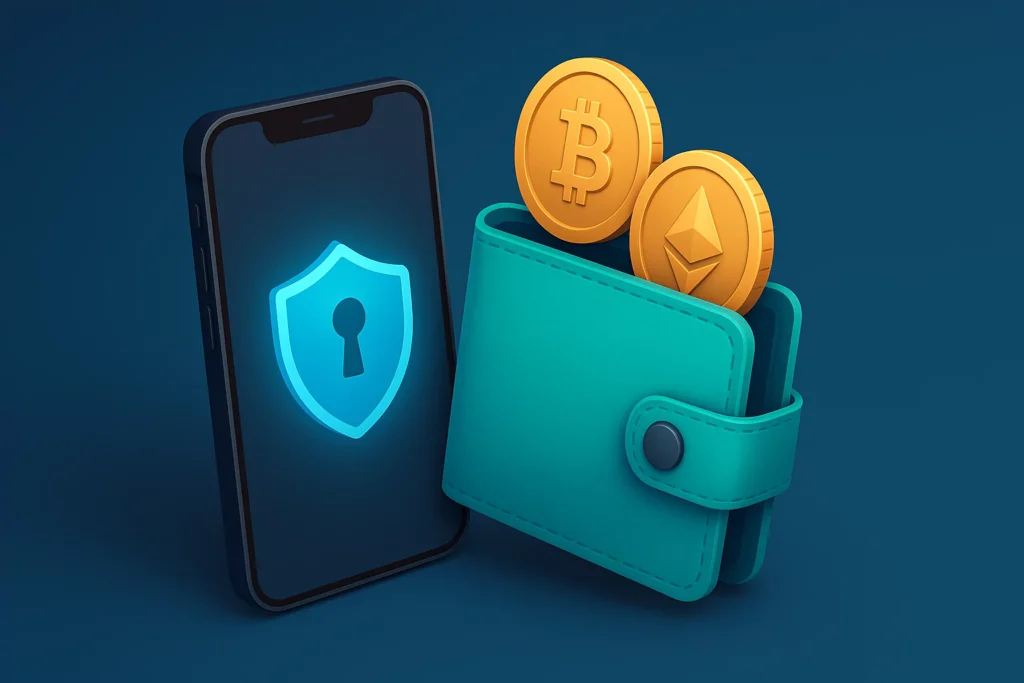What Is a Crypto Wallet?
0
0

The world of cryptocurrencies can be both exciting and intimidating, especially when it comes to understanding how to store these digital assets safely. If an individual has ever delved into the world of bitcoin and ethereum, they’ve likely come across the term “crypto wallet.” But what exactly is it, and why is it essential?

Understanding the basics of a crypto wallet
A crypto wallet is not a physical object like a traditional leather wallet one might carry around. Instead, it is a digital tool designed to manage digital currencies. While they don’t store your cryptocurrencies per se, they hold private keys, which are cryptographic details used to access funds on the blockchain. Without these keys, managing cryptocurrencies becomes impossible.
Think of a crypto wallet as an Internet banking app—an interface that facilitates interaction with virtual currency accounts. It allows users to view balances, make transactions, and engage with web3 applications. This self-custody solution puts users in complete control of their digital assets, offering a safe and secure storage method. Understanding how to operate a crypto wallet is an integral step toward active participation in the cryptocurrency ecosystem.
Different types of crypto wallets
The most common classification of crypto wallets is between software and hardware wallets. Software wallets can be further divided into mobile, desktop, and online wallets. Each option offers unique advantages and varying levels of security depending on user needs.
Hardware wallets, such as those produced by Ledger, offer unparalleled secure storage solutions. Hardware wallets are a type of cold wallets (offline wallets), but unlike them, they are physical devices enabling users to store their private keys offline, making them less vulnerable to hacking attacks. With a strong reputation for reliability, Ledger’s hardware wallets have become a popular choice among crypto enthusiasts who prioritize security.
Software wallets: Convenience at your fingertips
If ease of access is a priority, then software wallets might suit best. These wallets are easily downloadable applications compatible with smartphones or computers. They allow users to buy, sell, and swap digital currencies with just a few taps, thereby making the management of cryptocurrencies convenient.
Mobile wallets provide users with ultimate portability; they are suitable for those constantly on the go. Desktop wallets, on the other hand, offer more robust options for those preferring to manage their assets from a laptop or personal computer. For instance, some desktop wallets include features for integration with decentralized applications (dapps), opening new doors to web3 markets.
Online wallets: Easy access but increased risk
While online wallets present unparalleled convenience, allowing individuals to log in over the Internet from any device, they do expose users to higher security risks compared to other wallet types. Since online wallets store private keys on servers managed by third parties, this introduces additional vulnerabilities such as server hacking incidents.
Nonetheless, online wallets remain a favored choice for newcomers wishing to dip their toes into crypto waters without investing in more sophisticated equipment. Users must weigh the trade-offs between accessibility and potential exposure when opting for these platforms.
The role of private keys in crypto wallets
To comprehend the significance of a crypto wallet fully, it’s essential to grasp the function of private keys. Private keys are secret codes generated by wallets, unlocking the ability to manage cryptocurrencies. Think of them as the password granting exclusive access to a digital fortune.
Without possession of these keys, executing transactions or verifying ownership is impossible. Hence, safeguarding them becomes paramount—a fact echoing through the fundamental ethos governing self-custody within the crypto community. Unlike traditional bank accounts controlled by financial institutions, responsibility rests solely on individual users.
Backing up and securing private keys
Ensuring the safe backup of private keys should top every cryptocurrency holder’s priority list. While many software wallets offer built-in features for backing key files up to the cloud, caution is necessary. Consider alternatives such as writing seed phrases down carefully on paper or utilizing security vaults.
No matter the approach adopted, remember the proverbial wisdom ringing true here: losing access equates to losing holdings irrevocably forever! Avoid dangers associated with device theft, damage, malware, and unwanted intrusions modern-day cybercriminals persistently perpetrate.
Ledger: A leader in secure crypto storage
In an age where cybersecurity threats abound, possessing robust defense mechanisms against unauthorized access becomes a pressing need. Enter Ledger—a genuine frontrunner dedicated to developing first-rate hardware wallets offering premium levels of protective coverage. Ledger allows users to rest assured knowing their precious investments remain securely safeguarded behind cutting-edge encryption technology. It’s all about ensuring complete peace-of-mind while exploring opportunities offered by decentralized finance.
Particularly appealing to seasoned investors and amateurs alike, Ledger wallets support multiple currencies and compatibility across a diverse range of blockchains. Whether transacting with bitcoin, ethereum, or various altcoins, these versatile non-custodial solutions ensure seamless operation amid fluctuating digital landscapes.
Fostering trust with innovative technology
Ledger hardware wallets utilize advanced Secure Element (SE) chips similar to those employed in passports and credit cards, bolstering security protocols immensely. Furthermore, isolation remains guaranteed since transactions occur internally rather than involving external connections susceptible to breaches.
This commitment towards innovating continually drives the design evolution ensuring products stand resiliently prepared for future challenges emerging from rapid developments within spheres of blockchain engineering potential disruptions looming overhead globally.
The importance of choosing the right crypto wallet
Deciding upon the appropriate crypto wallet hinges largely upon personal preferences centered around factors like security levels desired versus ease-of-use expectations alongside cost considerations involved maintaining ongoing yet practical functionality. Evaluate requirements balancing trade-offs effectively enhancing overall satisfaction long-term monetary gains achievable en route.
- Hardware wallets provide enhanced security by storing private keys offline.
- Software wallets offer convenience through mobile and desktop applications.
- Private keys enable transaction execution and proof of ownership.
- Backing up keys is vital to prevent loss of access to cryptocurrencies.
- Ledger wallets deliver high-level protection using state-of-the-art technology.
This article is not intended as financial advice. Educational purposes only.
0
0
 Manage all your crypto, NFT and DeFi from one place
Manage all your crypto, NFT and DeFi from one placeSecurely connect the portfolio you’re using to start.





